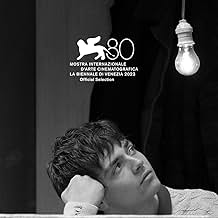IMDb RATING
6.8/10
1.1K
YOUR RATING
Fourteen-year-old Ahmet leaves home for an all-boys religious dormitory, navigating family expectations, religious duties, and holding onto childhood amid environmental and personal changes.Fourteen-year-old Ahmet leaves home for an all-boys religious dormitory, navigating family expectations, religious duties, and holding onto childhood amid environmental and personal changes.Fourteen-year-old Ahmet leaves home for an all-boys religious dormitory, navigating family expectations, religious duties, and holding onto childhood amid environmental and personal changes.
- Awards
- 15 wins & 26 nominations total
Esila Ergun
- Little Girl
- (as Esila Ergün)
- Director
- Writer
- All cast & crew
- Production, box office & more at IMDbPro
Featured reviews
I found this film to be exceptionally well-made. From the actors to the scenes, everything evoked a sense of nostalgia. The realism was top-notch. In my opinion, it beautifully portrayed the struggles of a child torn between Kemalism and Islam. It captured the essence of being caught in the middle, feeling trapped, with remarkable accuracy. These aspects were all very valuable. I was particularly struck by the line, "Who is greater, Allah or Atatürk?" I believe it was a significant statement.
Moreover, the film sheds light on the intense impact of religion and nationalism on children in Turkey, often unnoticed by society. This depiction of children feeling trapped between these powerful forces makes it a crucial piece of work. I hope it reaches a wide audience and that everyone has the chance to see it.
Moreover, the film sheds light on the intense impact of religion and nationalism on children in Turkey, often unnoticed by society. This depiction of children feeling trapped between these powerful forces makes it a crucial piece of work. I hope it reaches a wide audience and that everyone has the chance to see it.
10soulpark
When I first saw the trailer, I was genuinely excited and eagerly looking forward to watching it. There was something about the atmosphere and the visuals that instantly caught my attention and stayed with me. Last night, I finally had the chance to see it-and I absolutely loved it. It exceeded all my expectations and left a lasting impression. Both in terms of storytelling and cinematography, it was one of the most powerful, visually stunning, and emotionally captivating films I've seen in a long time. Every frame felt intentional, every moment meaningful. I can't recommend it enough-truly a must-watch.
If you only knew how sorry I feel for our children who experienced this and similar things. Unfortunately, things like this can still happen. Children who are sent to such dormitories for a purpose without even consulting their children may face many psychological problems throughout their lives. They always filter the events they experience through a religious filter and forget who they are. They lose their own character because they constantly shape their perspectives according to the moral values imposed on them. As someone who has many friends around him, like our main character Ahmet, and who has talked to people who have experienced such things many times, I was amazed. The director touched on the sensitive points so correctly that I felt like I had experienced these things. An incredible expression, so emotional. In my opinion, every viewer can find something from themselves in this movie... Congrats all the actors, especially precious director Nehir Tuna.
Dormitory
The film radiates corners, longing and monochromatic volumes. It is a heart where the blooming childhood enters in the forest of demarcations. The picturesque of black and white creates an enigmatic frame of emotions. It fleshes the character into the nuances of humanity of the bygone era and question about it. Promising frames, detailed costumes, classic editing, layered actors. The child Ahmets vulnerability, innocence and understanding goes through the tones of revolution. The film showcases an individual revelation of Godhood, companionship, parental relationships and openings of love.
Some films entertain, some impress, and a rare few reach directly into your life and show you a truth you hadn't yet found the words for. Yurt(The Dormitory), Nehir Tuna's hauntingly intimate debut, is one of those rare films. It is a quiet masterpiece-so precise in its storytelling, so understated in its emotion, and yet, somehow, so overwhelmingly powerful.
I watched Yurt and, for the first time in my life, felt as if a film had reached me not just as a viewer, but as a human being living through a particular place, time, and atmosphere. Every frame of this film breathes, pauses, and listens. It does not shout or beg to be noticed-it simply exists, fully and truthfully, in a way that feels more like memory than narrative.
The story follows a young boy sent to a religious dormitory, navigating the silence between belief and doubt, masculinity and vulnerability, discipline and desire. The setting-both literal and psychological-evokes suffocation, but never melodrama. Tuna's brilliance lies in his restraint. Instead of imposing judgment, he invites us to sit beside the boy, to see what he sees, feel what he feels, and above all, to remember.
Visually, the film is exquisite. The use of light and shadow is not just beautiful, but meaningful-it conveys everything that cannot be said aloud in this repressive environment. The color palette reflects the emotional state of its characters-faded, cold, sometimes harsh, sometimes warm enough to hint at the possibility of tenderness. Tuna has an exceptional eye, one that understands not only how to look, but when to look, and when to turn away.
What struck me most was how effortlessly the film communicated the complexity of growing up in a space where power, control, and religious ideology intertwine. There's no simplistic good vs. Evil here. Tuna treats each character-even the sternest authority figures-with a kind of compassionate distance. The dormitory itself becomes a metaphor for a society that demands conformity and punishes softness, but it's never reduced to just that. It's more than a symbol; it's a world-one many of us will find painfully familiar.
As someone who teaches a course on "Political Inclusion and Art" , It captures the nuances of our political and social reality without didacticism, without slogans, and with a depth that only great art can offer. It tells the story of a generation growing up under quiet, everyday pressures-expectations about who they should be, how they should feel, what they should believe. But it tells that story with care, patience, and immense artistic control.
Nehir Tuna is a filmmaker whose lens understands the youth of this country better than any political analysis. His gaze is not just observant, it is human. He does not dramatize suffering-he simply shows it, in its slow, real, and often invisible forms.
Thank you, Nehir Tuna, for making something so precise, so compassionate, and so needed. You've given us a story that lingers-and a silence that speaks louder than anything else.
I watched Yurt and, for the first time in my life, felt as if a film had reached me not just as a viewer, but as a human being living through a particular place, time, and atmosphere. Every frame of this film breathes, pauses, and listens. It does not shout or beg to be noticed-it simply exists, fully and truthfully, in a way that feels more like memory than narrative.
The story follows a young boy sent to a religious dormitory, navigating the silence between belief and doubt, masculinity and vulnerability, discipline and desire. The setting-both literal and psychological-evokes suffocation, but never melodrama. Tuna's brilliance lies in his restraint. Instead of imposing judgment, he invites us to sit beside the boy, to see what he sees, feel what he feels, and above all, to remember.
Visually, the film is exquisite. The use of light and shadow is not just beautiful, but meaningful-it conveys everything that cannot be said aloud in this repressive environment. The color palette reflects the emotional state of its characters-faded, cold, sometimes harsh, sometimes warm enough to hint at the possibility of tenderness. Tuna has an exceptional eye, one that understands not only how to look, but when to look, and when to turn away.
What struck me most was how effortlessly the film communicated the complexity of growing up in a space where power, control, and religious ideology intertwine. There's no simplistic good vs. Evil here. Tuna treats each character-even the sternest authority figures-with a kind of compassionate distance. The dormitory itself becomes a metaphor for a society that demands conformity and punishes softness, but it's never reduced to just that. It's more than a symbol; it's a world-one many of us will find painfully familiar.
As someone who teaches a course on "Political Inclusion and Art" , It captures the nuances of our political and social reality without didacticism, without slogans, and with a depth that only great art can offer. It tells the story of a generation growing up under quiet, everyday pressures-expectations about who they should be, how they should feel, what they should believe. But it tells that story with care, patience, and immense artistic control.
Nehir Tuna is a filmmaker whose lens understands the youth of this country better than any political analysis. His gaze is not just observant, it is human. He does not dramatize suffering-he simply shows it, in its slow, real, and often invisible forms.
Thank you, Nehir Tuna, for making something so precise, so compassionate, and so needed. You've given us a story that lingers-and a silence that speaks louder than anything else.
Did you know
- TriviaYURT is a Turkish-German-French co-production.
- How long is Dormitory?Powered by Alexa
Details
Box office
- Gross worldwide
- $86,322
- Runtime1 hour 56 minutes
- Color
Contribute to this page
Suggest an edit or add missing content





















